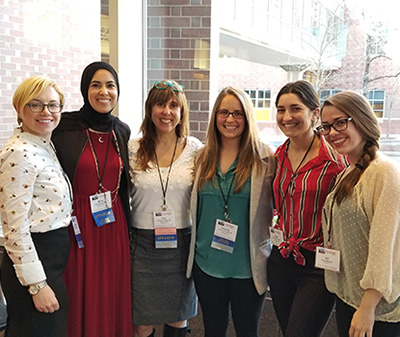Geller Women’s Health Psychology Lab
Department of Psychological and Brain Sciences
 Members of the Women’s Health Psychology Lab
Members of the Women’s Health Psychology Lab
Welcome to Professor Pamela Geller’s Women's Health Psychology Lab!
Our research focuses on health psychology, specifically women's reproductive health.
We study stressful life events and mental and physical health outcomes and the role of personal and social resources as moderators of stress, within the context of women’s reproductive life events.
Prospective applicants are encouraged to view the frequently asked questions page and to also read about our current research below to gain more information about our lab.
Please note: This information was last updated in October 2024.
Current Research
Members of our lab are currently pursuing a number of research directions, reflected in graduate students' thesis and dissertation projects, as well as lab-wide studies. Our current lines of research generally pertain to women's health psychology, and include issues related to reproductive health and stressful life events. Below are descriptions of our ongoing research projects.
For information about opportunities to enroll in ongoing projects, please visit our Research Participation page.
Mother Baby Connections Program and MommaConnect
This is an interdisciplinary intensive outpatient program serving women with depression, anxiety, and psychological distress during pregnancy and postpartum. Interventions target areas such as symptom reduction, maternal-infant interaction, and relationship with partner (e.g., spouse). This service is provided through the Drexel Psychological Services Center. Dr. Geller is the Co-Director of Mother Baby Connections and Co-Founder with Dr. Bobbie Posmontier and Dr. June Horowitz. The team collaborates on perinatal mental health research, such as NIH-funded research to develop a specialized app (MommaConnect) for use by perinatal mental health clinicians and postpartum individuals for the treatment of postpartum depression and quality of maternal-infant interaction.
EmBRACE NICU Projects
EmBRACE (Empower NICU—A Bridge to Resources for Adjusting and Coping with Emotions) is a project funded by the Agency for Healthcare Research and Quality, Department of Health and Human Services to develop and test a mobile health application. EmBRACE will provide universal mental health screening, ongoing monitoring, access to tailored psychoeducation, and referrals to support parents and caregivers with an infant hospitalized in a newborn intensive care unit (NICU).
Newborn/Infant Intensive Care Unit (N/IICU) Projects at CHOP
Admission into a hospital setting can be a stressful experience for families of neonatal infants. In collaboration with the Children's Hospital of Philadelphia (CHOP), the Women's Health Psychology Lab is developing interventions designed to provide psychosocial support to parents with infants in CHOP’s Newborn/Infant Intensive Care Unit (N/IICU). Research assistants may help with parent support groups and medical provider education in the CHOP N/IICU. Several projects are ongoing: a quality improvement project to better support NICU families and offer screening for psychological distress, a psychoeducational group for families, psychosocial trainings for nurses on how to deal with difficult families in the NICU, and consultation services to other members of the CHOP N/IICU care team. Related clinical research projects also are in the process of development.
Minority Women’s Experience of Pregnancy Loss
The Pregnancy Loss study is a theory-driven, quantitative investigation of how race/ethnicity affects women's coping strategies after pregnancy loss. This study has several aims: 1) to document the occurrence of grief, depressive, and anxiety reactions following the experiences of miscarriage and stillbirth; 2) to compare these experiences of grief, depressive, and anxiety reactions by gestational length at time of loss; 3) to examine the relationship between psychological distress and women's attributions for the loss, perception of care provided by healthcare professionals and provision of etiological information following loss; and 4) to assess post-traumatic stress disorder (PTSD) symptomology among women who have experienced pregnancy loss. This project is led by Victoria Grunberg.
Secondary Traumatic Stress in NICU Nurses
This project aims to evaluate individual and organizational predictive risk and protective factors for secondary traumatic stress in a national sample of NICU nurses. This project is led by Leah Sodowick.
Recent Research Projects
REDUCING DISTRESS IN MUSLIM WOMEN EXPERIENCING INFERTILITY
Research suggests that despite a high prevalence of stress and depression among Muslim women experiencing infertility, few engage in psychotherapy. This research study aims to address barriers to seeking psychotherapy and to reduce depressive symptoms in this population using a newly developed internet-based intervention. Project leader: Mona Elgohail, PhD.
Maternal Self-Efficacy in the Postpartum Period
This project aims to begin development of a new measure of maternal self-efficacy through the collection of qualitative data from postpartum mothers. The goal is to translate this qualitative data into items in a new quantitative measure as a means of both generating a patient-centered and content valid measure of self-efficacy as well as to inform the development of future psychological interventions for new mothers. Project leader: Ari Albanese, PhD.
Sleep and Reproductive Health
This project aims to understand sleep among women who are pregnant and those who are trying to get pregnant, including those with infertility. The goal of this research is to uncover how sleep quantity and quality may affect mental and physical health in women of reproductive age, how sleep may affect fertility, and how poor sleep may confer risk to mother and infant. Project Leader: Ali Hartman, PhD.